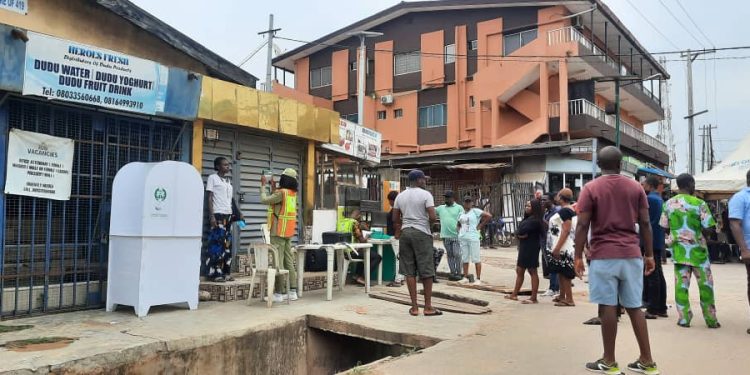The 2023 Gubernatorial and State Houses of Assembly Elections which held on March 18, 2023, experienced some form of improvement with regard to the provision made by the Independent National Electoral Commission (INEC) to enhance the participation of Persons with Disabilities (PWDs) in the electoral process.
However, the improvements recorded in many polling units across the country were largely in relation to the availability of form EC40H which is meant to document the number of PWDs present at the polling unit, to enable INEC to make adequate provisions for PWDs in their respective polling units in subsequent elections.
Also, priority voting access was given to PWDs in their respective polling units, even though there were reported low voters turnout, and the Voting guide for Deaf Persons, Form EC30E was available in many polling units.
On the other hand, PWDs still lamented the non-availability of assistive devices such as ballot braille guides and magnifying glasses in their polling units. Some polling units were also not cited in locations that would enhance easy access to PWDs.
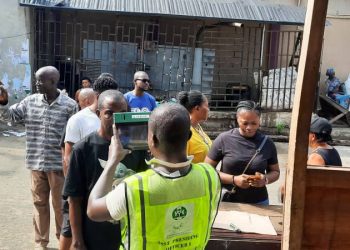
Assistive Devices
Speaking with BONews Service, Abdullahi Usman, the President of the Joint National Association of Persons with Disabilities (JONAPWD), the umbrella body of all disability clusters and groups in Nigeria, expressed disappointment with the non-provision of assistive devices to PWDs across the country as promised by INEC.
Usman who noted that PWDs came out en-masse to participate in the electoral process because of the numerous promises made by INEC to make the voting process inclusive and accessible, mentioned that INEC did not fulfill its promises.
Speaking specifically about Kebbi State, Usman stated that “there were no single assistive devices for PWDs.
“There was no single provision for PWDs in terms of infrastructure because the majority of the polling units were not accessible to PWDs.”
Beyond Kebbi, the JONAPWD President noted that reports from other states indicated that the situation was similar across the country.
The Executive Director of TAF Africa, Jake Epelle who said he had high hopes that INEC would make the assistive devices available during the March 18 elections, said “INEC still fell short with the deployment of assistive devices to polling units across the country.”
Epele noted that “we got less than 26% of deployment of assistive devices across the country.
“What happened to the assistive devices that INEC showed us? Where were they deployed to?” Epelle asked while speaking on Arise TV.
He further mentioned that there was no single magnifying glass for persons with Albinism in all the PUs in Nasarawa state, where he monitored.
“I thought INEC will use this gubernatorial election to redeem its image based on what happened during the presidential election, but that was not the situation,” Epelle added.
Corroborating the non-deployment of assistive devices to PUs, the President of the Albinism Association of Nigeria (AAN), Mrs. Bisi Bamishe who voted at PU30A, College road, Ifako-Ijaiye LGA, Lagos, explained that there were no magnifying glasses in her polling unit.
Bamishe mentioned that her members across Lagos, Benue, and Kano reported that not a single magnifying glass were sighted in PUs across the states.
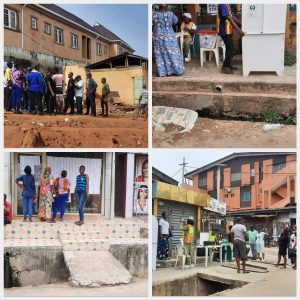
Priority Voting
Mrs. Bamishe acknowledged that members of the AAN recorded that they were given priority voting access in their polling units.
“I got to my polling unit late, around 2 pm, and I just walked in and voted immediately. There was no more queue at the time,” she added.
Also narrating her polling unit experience, Egwu Stella Udoka, a woman with a physical disability, who voted at the GTC Secondary School, Ebonyi LGA, Ebonyi State shared that she benefited from priority voting access.
Similarly, Tolani Ojuri, the Chairman of the Lagos State Chapter of AAN who voted at PU 017, Kadiri/Ajayi, Ifako-Ijaiye LGA, Lagos explained that he experienced priority voting access in his polling unit.

The turnout of PWD Voters
Speaking about the turnout of PWD voters at the polls, Ojuri believes that there is a decline in comparison to the Presidential elections on February 25.
Ojuri who shared that there was a Blind man in his polling unit during the presidential election said the man did not participate in the gubernatorial election.
“There was a general low voter turnout, but I am certain that the non-provision of assistive devices deterred many PWDs from coming out.
“The Blind man who voted in my polling unit during the presidential election didn’t come this time around. He might have felt that it wasn’t worth the stress, because he went through a lot of challenges before he could cast his vote during the February 25 elections.
“His wife was around to vote, but he didn’t come. That might be the same as other PWDs in many polling units,” he narrated.
Mr. Pius Enefiok Nyong, a Blind and leg amputee man, shared that he couldn’t go to his polling unit at Charity, Oshodi-Isolo LGA, Lagos because of the violent incidents in his polling units.
“There were pockets of violence in my area, Oshodi-Mafoluku axis, which prevented me from going out to vote.
“Some political thugs were using canes to flog people if they were not going to vote for a particular party. They also announced from street to street, which I heard clearly, that we shouldn’t bother to come out if we won’t vote for a particular party,” he explained.
Nyong also noted that it was safer for him to stay indoors because it would have been dangerous and difficult for him to flee to safety, because of his disability, if any major crisis should break out in his polling unit.
Udoka also noted that she left her polling unit immediately after casting her vote because she felt unsafe.
“I had to leave the polling unit immediately after casting my vote. The luck I had was that I went there early because political thugs were attacking people they perceived as opposition.
“This obviously prevented some other PWDs from going out to vote, because it is better to stay safe than to expose oneself to attacks,” she added.
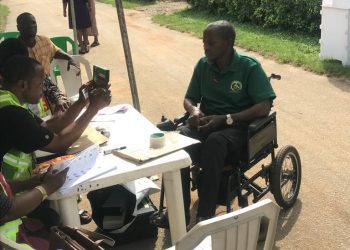
Improvements from Feb 25 Elections?
The JONAPWD President mentioned that there was little improvement in the Gubernatorial and States House of Assembly elections when compared to the Presidential and National Assembly elections.
He explained that there was no form EC40H, in his polling unit during the presidential election, but it was made available during the gubernatorial elections.
“There were small improvements for PWDs yesterday, when I got to my polling unit, the INEC ad-hoc staff told me that the form EC40H was available, and she filled the form right there, in my presence,” he added.
Mrs. Bamishe on her part said, “there is no difference at all, the time was too short for INEC to make major changes.
“The only thing is that the INEC official filled out the form EC40H in my presence.
Tolani Ojuri also shared with BONews Service that the form EC40H was available in his polling unit.
“The form has a list of clusters which include albinism, hearing impairment, physical, visual impairment, and others. There is no dwarf or leprosy survivor on the list,” he added.
Also, the voting guide for PWDs, form EC30E (Deaf) was seen pasted in several polling units in Ifako-Ijaiye and Ikeja LGAS in Lagos State.
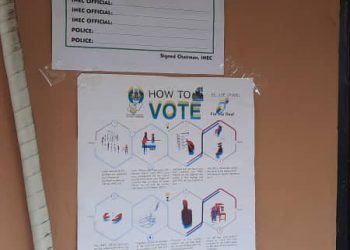
Beyond 2023 Elections
To ensure equal voting access to PWDs going forward, the JONAPWD President tasked INEC with the need to do more to make sure there is full participation of PWDS in the electoral process.
Usman stressed that INEC needs to begin to make adequate provisions for PWDs, long before the election window approaches, to ensure that all the boxes are ticked.
He also advised the electoral umpire to set up PUs on flat grounds and accessible locations to all disability clusters.
“INEC should use the voter register that is disaggregated by disability to deploy assistive devices to PWDs in their polling units,” he remarked.
Mrs. Bamishe of AAN also emphasised the need for INEC to make the prints on the voting materials legible for persons with albinism.
“INEC should make the prints more visible and increase the font size because it seems they won’t be able to make provision for magnifying glasses, as they have failed to do that so far.
“INEC should also get more PWDs involved in the process. Now that the election is over, they should listen to all the feedback from the community,” she added.
Bamishe also mentioned that INEC should begin to mount polling cubicles in accessible locations for PWDs.
It is also important that community members take the responsibility of assisting INEC officials in setting up polling units in places that are accessible to PWDs.
This story was produced with the support of the Media Support Center.

